Python Assignment: Implementing Algorithms and Programming Tasks
VerifiedAdded on 2020/10/05
|24
|6156
|124
Homework Assignment
AI Summary
This document presents a Python 3 assignment solution encompassing various programming tasks and algorithmic implementations. The assignment includes a single program featuring menu-driven options, covering fundamental programming concepts such as defining algorithms, outlining programming processes, and exploring procedural, object-oriented, and event-driven programming paradigms. It involves the implementation of algorithms using an IDE, debugging processes, and adherence to coding standards. The code includes tasks like 'Hello C#', character printing, area and perimeter calculations, time of journey, student examination results analysis, a random number generator, array sum, a bouncing ball game, math practice questions, and a menu-driven exit option. The solution also includes a discussion on defining algorithms, application development steps, and the importance of external specifications and debugging.
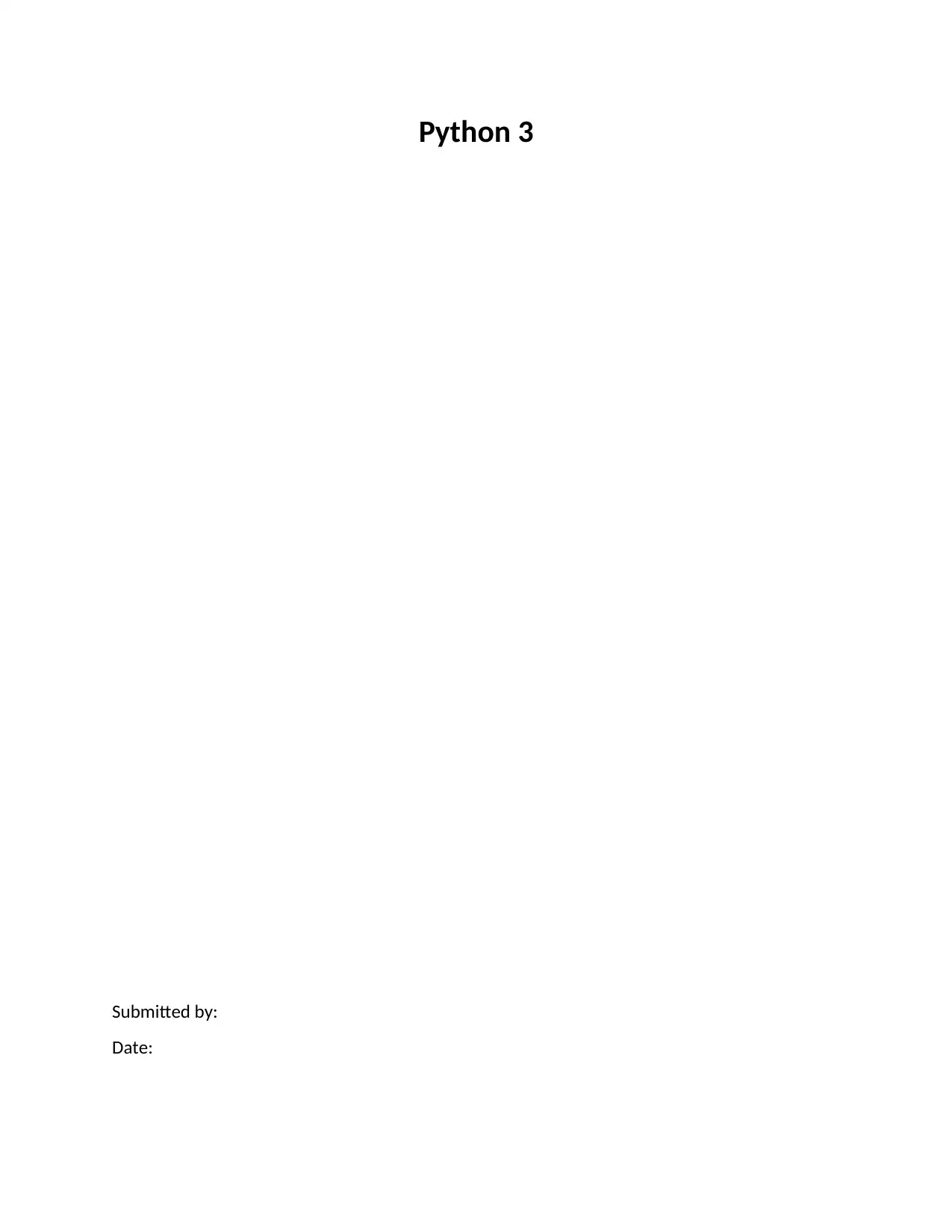
Python 3
Submitted by:
Date:
Submitted by:
Date:
Paraphrase This Document
Need a fresh take? Get an instant paraphrase of this document with our AI Paraphraser
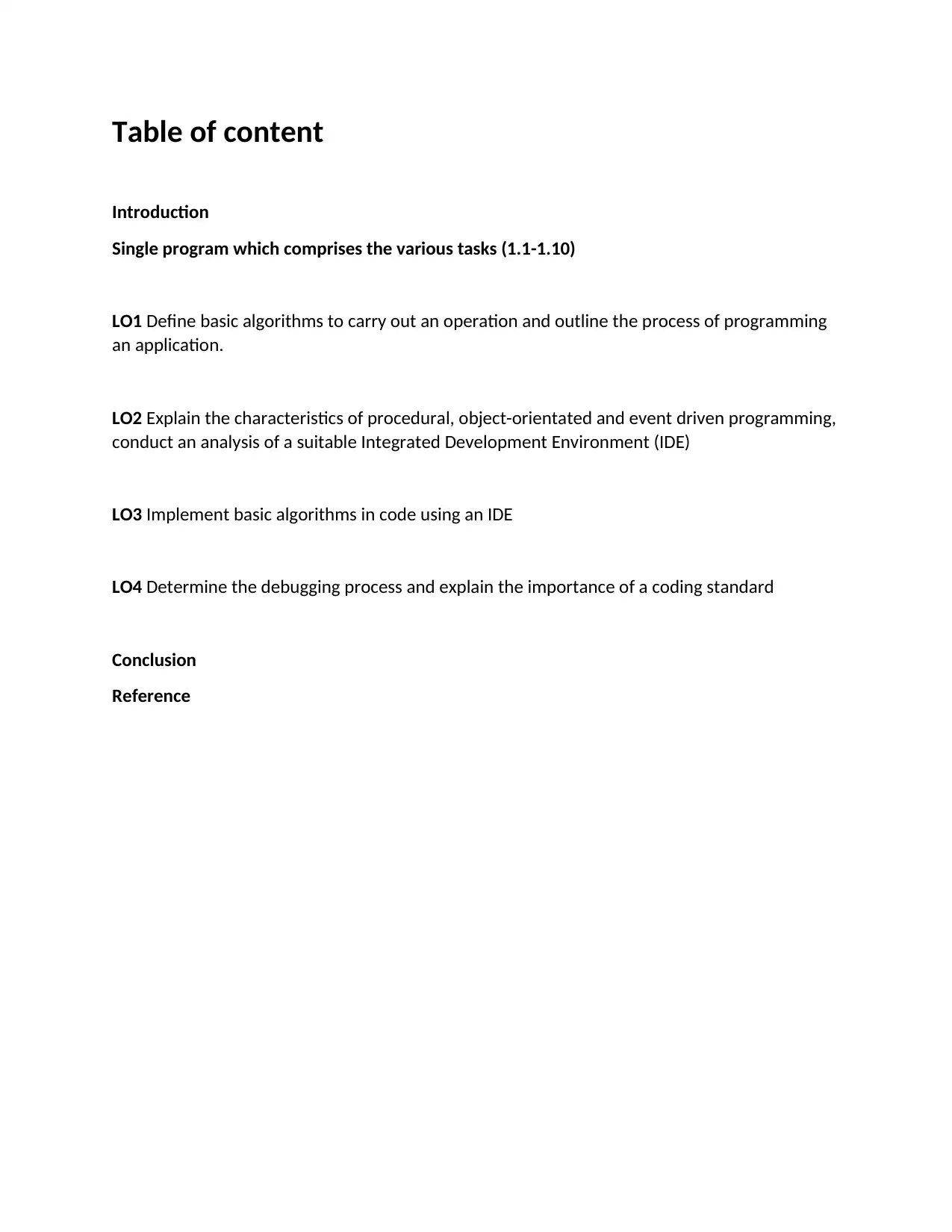
Table of content
Introduction
Single program which comprises the various tasks (1.1-1.10)
LO1 Define basic algorithms to carry out an operation and outline the process of programming
an application.
LO2 Explain the characteristics of procedural, object-orientated and event driven programming,
conduct an analysis of a suitable Integrated Development Environment (IDE)
LO3 Implement basic algorithms in code using an IDE
LO4 Determine the debugging process and explain the importance of a coding standard
Conclusion
Reference
Introduction
Single program which comprises the various tasks (1.1-1.10)
LO1 Define basic algorithms to carry out an operation and outline the process of programming
an application.
LO2 Explain the characteristics of procedural, object-orientated and event driven programming,
conduct an analysis of a suitable Integrated Development Environment (IDE)
LO3 Implement basic algorithms in code using an IDE
LO4 Determine the debugging process and explain the importance of a coding standard
Conclusion
Reference
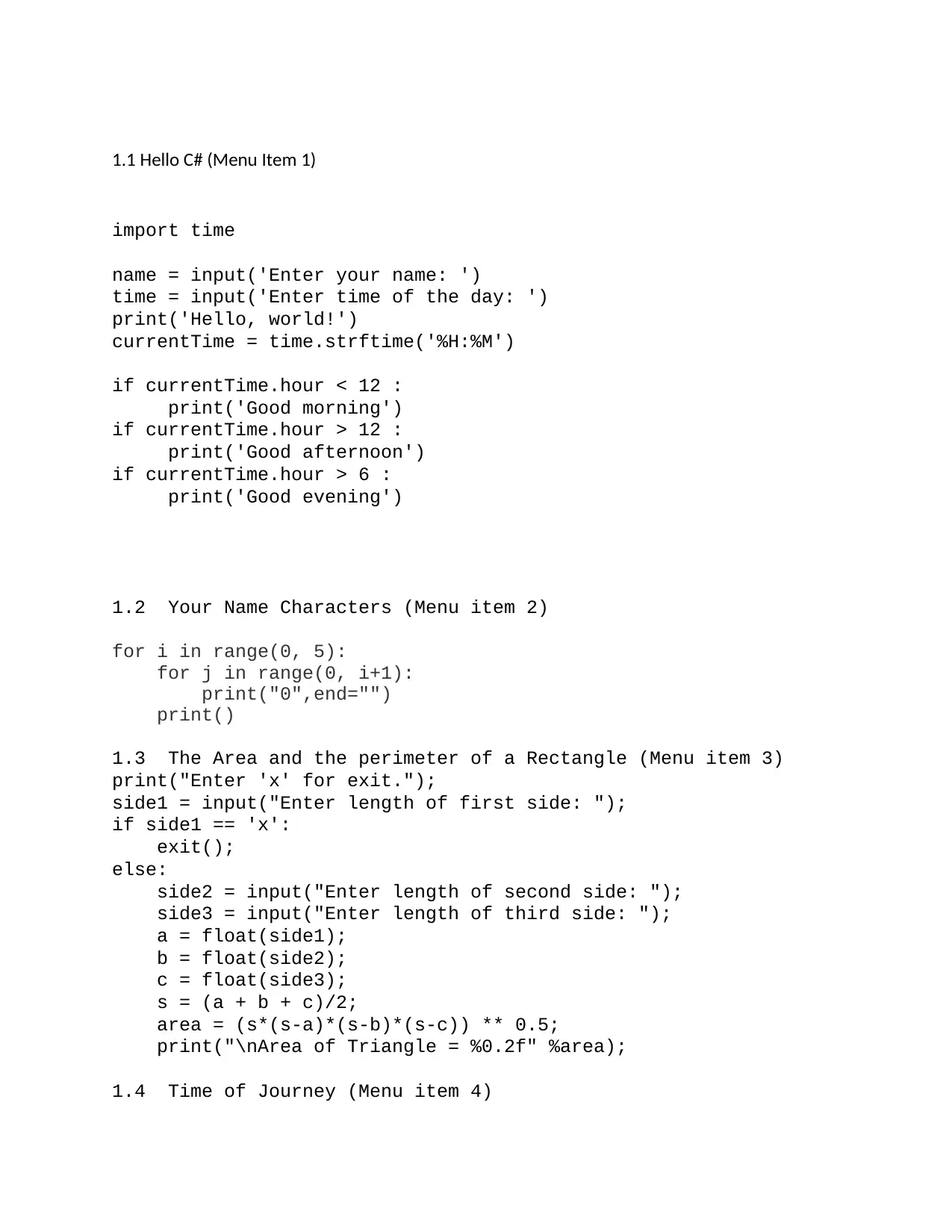
1.1 Hello C# (Menu Item 1)
import time
name = input('Enter your name: ')
time = input('Enter time of the day: ')
print('Hello, world!')
currentTime = time.strftime('%H:%M')
if currentTime.hour < 12 :
print('Good morning')
if currentTime.hour > 12 :
print('Good afternoon')
if currentTime.hour > 6 :
print('Good evening')
1.2 Your Name Characters (Menu item 2)
for i in range(0, 5):
for j in range(0, i+1):
print("0",end="")
print()
1.3 The Area and the perimeter of a Rectangle (Menu item 3)
print("Enter 'x' for exit.");
side1 = input("Enter length of first side: ");
if side1 == 'x':
exit();
else:
side2 = input("Enter length of second side: ");
side3 = input("Enter length of third side: ");
a = float(side1);
b = float(side2);
c = float(side3);
s = (a + b + c)/2;
area = (s*(s-a)*(s-b)*(s-c)) ** 0.5;
print("\nArea of Triangle = %0.2f" %area);
1.4 Time of Journey (Menu item 4)
import time
name = input('Enter your name: ')
time = input('Enter time of the day: ')
print('Hello, world!')
currentTime = time.strftime('%H:%M')
if currentTime.hour < 12 :
print('Good morning')
if currentTime.hour > 12 :
print('Good afternoon')
if currentTime.hour > 6 :
print('Good evening')
1.2 Your Name Characters (Menu item 2)
for i in range(0, 5):
for j in range(0, i+1):
print("0",end="")
print()
1.3 The Area and the perimeter of a Rectangle (Menu item 3)
print("Enter 'x' for exit.");
side1 = input("Enter length of first side: ");
if side1 == 'x':
exit();
else:
side2 = input("Enter length of second side: ");
side3 = input("Enter length of third side: ");
a = float(side1);
b = float(side2);
c = float(side3);
s = (a + b + c)/2;
area = (s*(s-a)*(s-b)*(s-c)) ** 0.5;
print("\nArea of Triangle = %0.2f" %area);
1.4 Time of Journey (Menu item 4)
⊘ This is a preview!⊘
Do you want full access?
Subscribe today to unlock all pages.

Trusted by 1+ million students worldwide
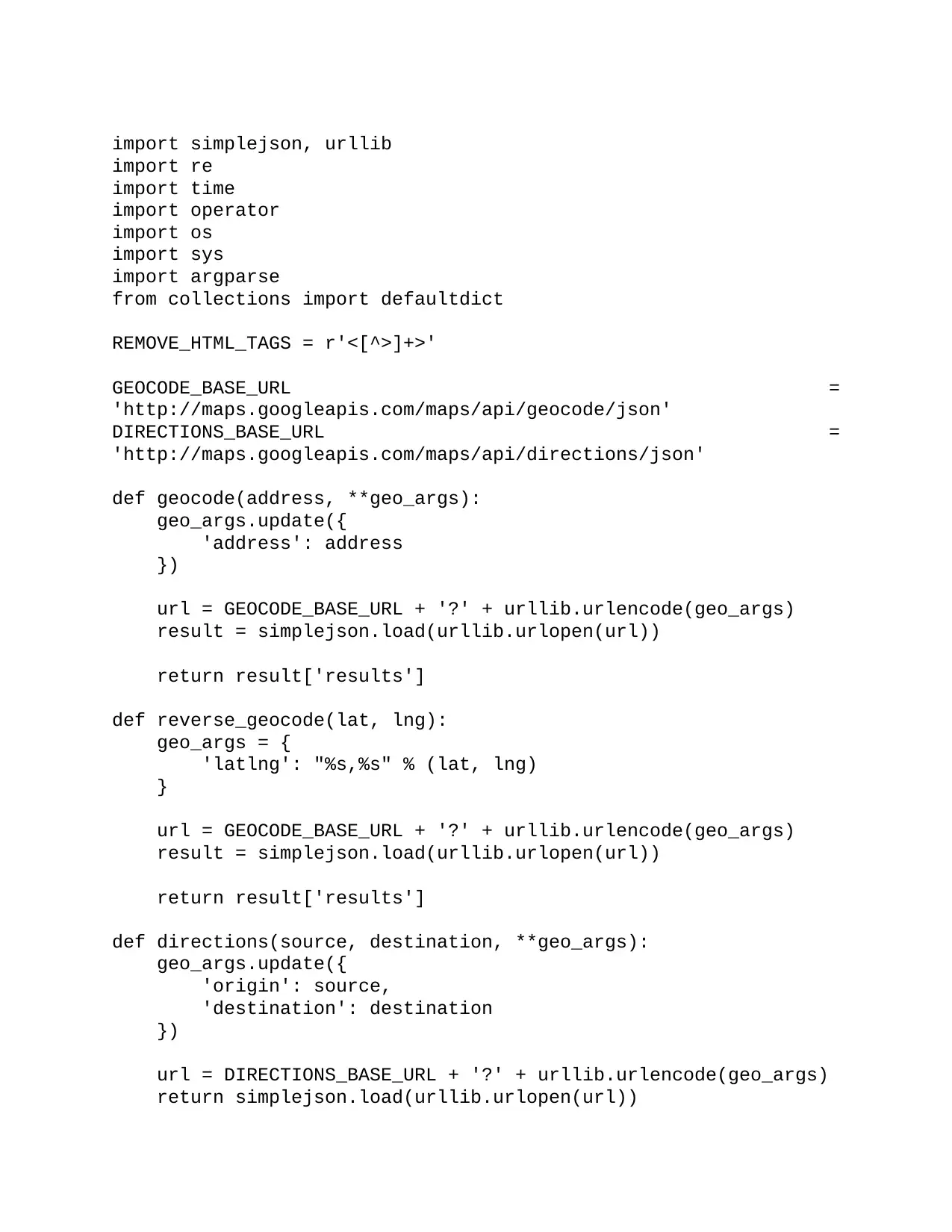
import simplejson, urllib
import re
import time
import operator
import os
import sys
import argparse
from collections import defaultdict
REMOVE_HTML_TAGS = r'<[^>]+>'
GEOCODE_BASE_URL =
'http://maps.googleapis.com/maps/api/geocode/json'
DIRECTIONS_BASE_URL =
'http://maps.googleapis.com/maps/api/directions/json'
def geocode(address, **geo_args):
geo_args.update({
'address': address
})
url = GEOCODE_BASE_URL + '?' + urllib.urlencode(geo_args)
result = simplejson.load(urllib.urlopen(url))
return result['results']
def reverse_geocode(lat, lng):
geo_args = {
'latlng': "%s,%s" % (lat, lng)
}
url = GEOCODE_BASE_URL + '?' + urllib.urlencode(geo_args)
result = simplejson.load(urllib.urlopen(url))
return result['results']
def directions(source, destination, **geo_args):
geo_args.update({
'origin': source,
'destination': destination
})
url = DIRECTIONS_BASE_URL + '?' + urllib.urlencode(geo_args)
return simplejson.load(urllib.urlopen(url))
import re
import time
import operator
import os
import sys
import argparse
from collections import defaultdict
REMOVE_HTML_TAGS = r'<[^>]+>'
GEOCODE_BASE_URL =
'http://maps.googleapis.com/maps/api/geocode/json'
DIRECTIONS_BASE_URL =
'http://maps.googleapis.com/maps/api/directions/json'
def geocode(address, **geo_args):
geo_args.update({
'address': address
})
url = GEOCODE_BASE_URL + '?' + urllib.urlencode(geo_args)
result = simplejson.load(urllib.urlopen(url))
return result['results']
def reverse_geocode(lat, lng):
geo_args = {
'latlng': "%s,%s" % (lat, lng)
}
url = GEOCODE_BASE_URL + '?' + urllib.urlencode(geo_args)
result = simplejson.load(urllib.urlopen(url))
return result['results']
def directions(source, destination, **geo_args):
geo_args.update({
'origin': source,
'destination': destination
})
url = DIRECTIONS_BASE_URL + '?' + urllib.urlencode(geo_args)
return simplejson.load(urllib.urlopen(url))
Paraphrase This Document
Need a fresh take? Get an instant paraphrase of this document with our AI Paraphraser
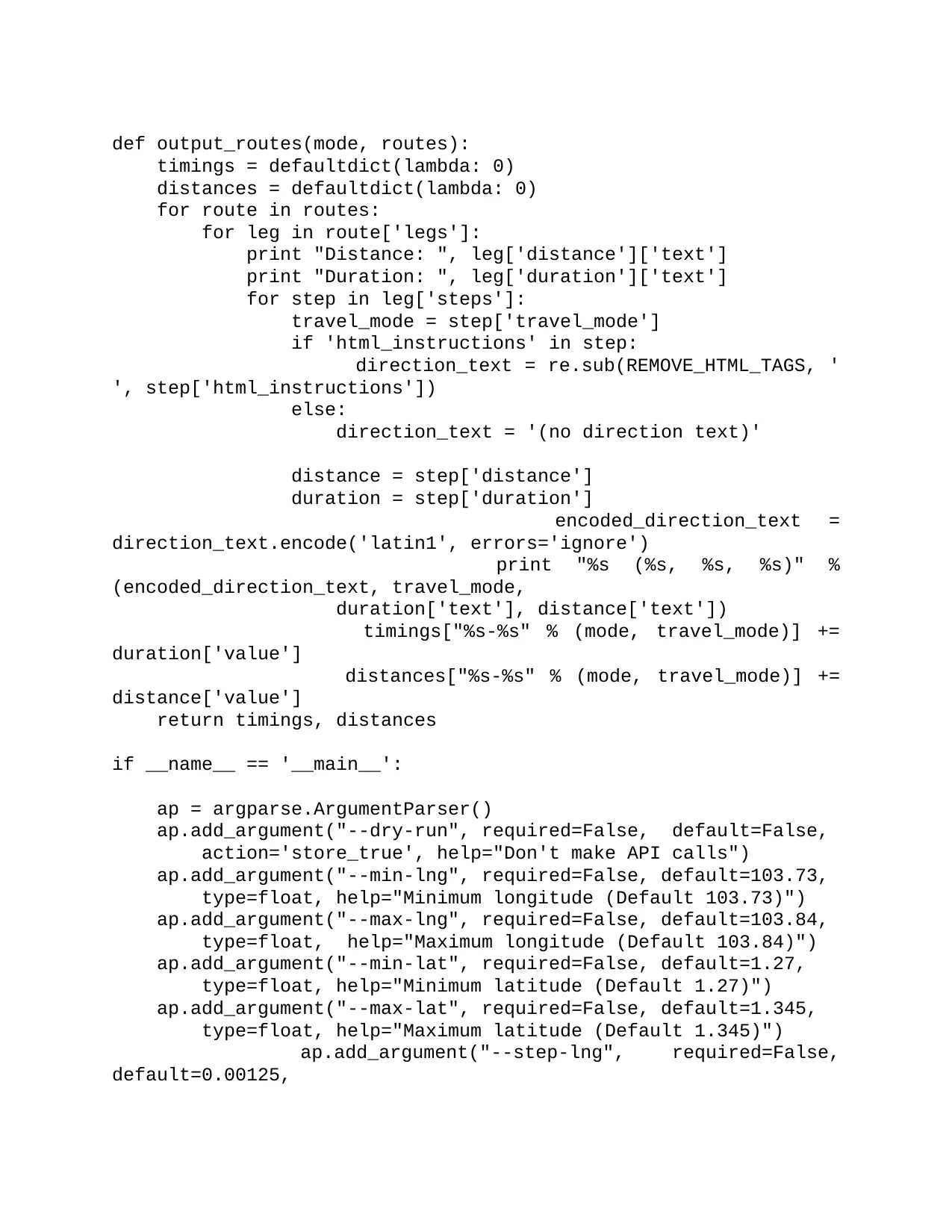
def output_routes(mode, routes):
timings = defaultdict(lambda: 0)
distances = defaultdict(lambda: 0)
for route in routes:
for leg in route['legs']:
print "Distance: ", leg['distance']['text']
print "Duration: ", leg['duration']['text']
for step in leg['steps']:
travel_mode = step['travel_mode']
if 'html_instructions' in step:
direction_text = re.sub(REMOVE_HTML_TAGS, '
', step['html_instructions'])
else:
direction_text = '(no direction text)'
distance = step['distance']
duration = step['duration']
encoded_direction_text =
direction_text.encode('latin1', errors='ignore')
print "%s (%s, %s, %s)" %
(encoded_direction_text, travel_mode,
duration['text'], distance['text'])
timings["%s-%s" % (mode, travel_mode)] +=
duration['value']
distances["%s-%s" % (mode, travel_mode)] +=
distance['value']
return timings, distances
if __name__ == '__main__':
ap = argparse.ArgumentParser()
ap.add_argument("--dry-run", required=False, default=False,
action='store_true', help="Don't make API calls")
ap.add_argument("--min-lng", required=False, default=103.73,
type=float, help="Minimum longitude (Default 103.73)")
ap.add_argument("--max-lng", required=False, default=103.84,
type=float, help="Maximum longitude (Default 103.84)")
ap.add_argument("--min-lat", required=False, default=1.27,
type=float, help="Minimum latitude (Default 1.27)")
ap.add_argument("--max-lat", required=False, default=1.345,
type=float, help="Maximum latitude (Default 1.345)")
ap.add_argument("--step-lng", required=False,
default=0.00125,
timings = defaultdict(lambda: 0)
distances = defaultdict(lambda: 0)
for route in routes:
for leg in route['legs']:
print "Distance: ", leg['distance']['text']
print "Duration: ", leg['duration']['text']
for step in leg['steps']:
travel_mode = step['travel_mode']
if 'html_instructions' in step:
direction_text = re.sub(REMOVE_HTML_TAGS, '
', step['html_instructions'])
else:
direction_text = '(no direction text)'
distance = step['distance']
duration = step['duration']
encoded_direction_text =
direction_text.encode('latin1', errors='ignore')
print "%s (%s, %s, %s)" %
(encoded_direction_text, travel_mode,
duration['text'], distance['text'])
timings["%s-%s" % (mode, travel_mode)] +=
duration['value']
distances["%s-%s" % (mode, travel_mode)] +=
distance['value']
return timings, distances
if __name__ == '__main__':
ap = argparse.ArgumentParser()
ap.add_argument("--dry-run", required=False, default=False,
action='store_true', help="Don't make API calls")
ap.add_argument("--min-lng", required=False, default=103.73,
type=float, help="Minimum longitude (Default 103.73)")
ap.add_argument("--max-lng", required=False, default=103.84,
type=float, help="Maximum longitude (Default 103.84)")
ap.add_argument("--min-lat", required=False, default=1.27,
type=float, help="Minimum latitude (Default 1.27)")
ap.add_argument("--max-lat", required=False, default=1.345,
type=float, help="Maximum latitude (Default 1.345)")
ap.add_argument("--step-lng", required=False,
default=0.00125,
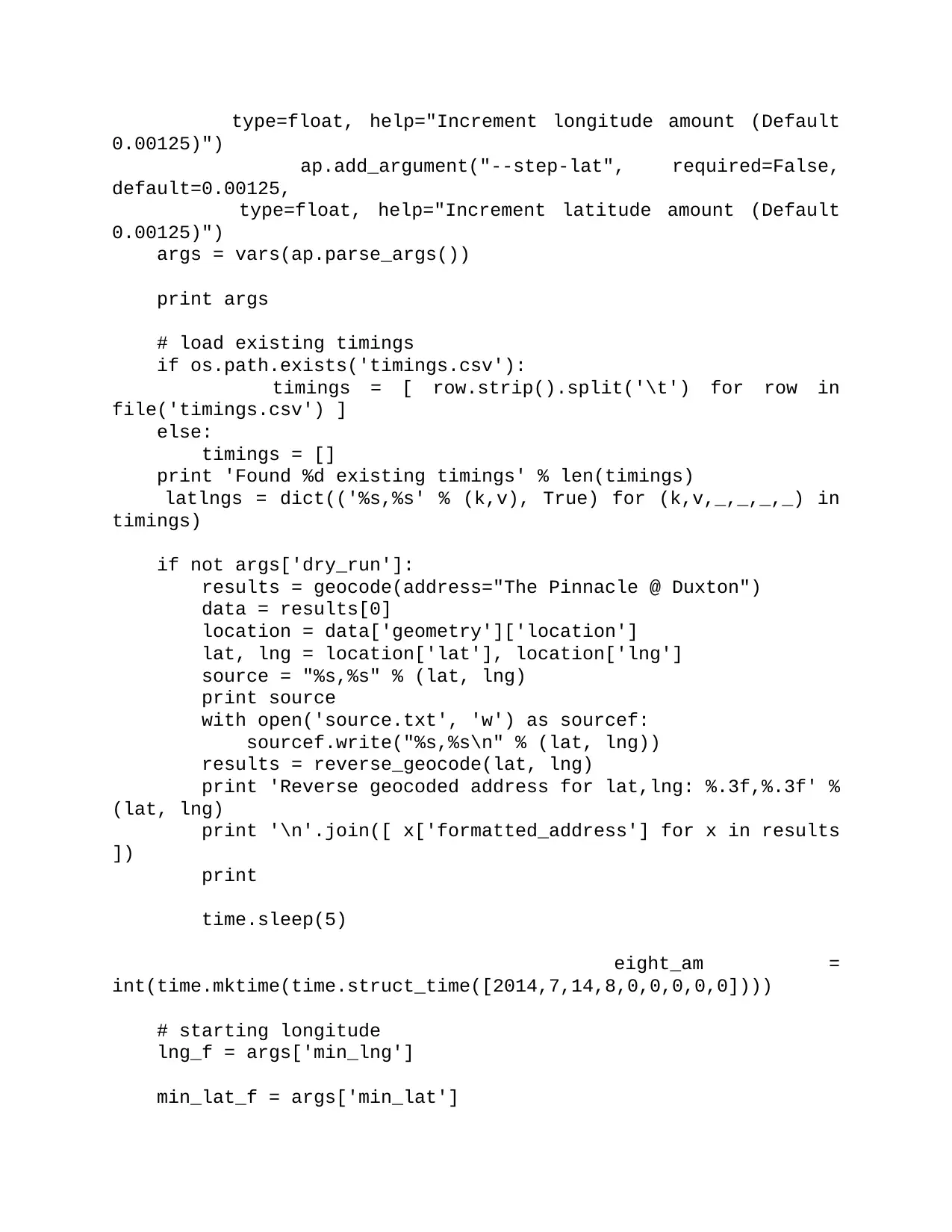
type=float, help="Increment longitude amount (Default
0.00125)")
ap.add_argument("--step-lat", required=False,
default=0.00125,
type=float, help="Increment latitude amount (Default
0.00125)")
args = vars(ap.parse_args())
print args
# load existing timings
if os.path.exists('timings.csv'):
timings = [ row.strip().split('\t') for row in
file('timings.csv') ]
else:
timings = []
print 'Found %d existing timings' % len(timings)
latlngs = dict(('%s,%s' % (k,v), True) for (k,v,_,_,_,_) in
timings)
if not args['dry_run']:
results = geocode(address="The Pinnacle @ Duxton")
data = results[0]
location = data['geometry']['location']
lat, lng = location['lat'], location['lng']
source = "%s,%s" % (lat, lng)
print source
with open('source.txt', 'w') as sourcef:
sourcef.write("%s,%s\n" % (lat, lng))
results = reverse_geocode(lat, lng)
print 'Reverse geocoded address for lat,lng: %.3f,%.3f' %
(lat, lng)
print '\n'.join([ x['formatted_address'] for x in results
])
print
time.sleep(5)
eight_am =
int(time.mktime(time.struct_time([2014,7,14,8,0,0,0,0,0])))
# starting longitude
lng_f = args['min_lng']
min_lat_f = args['min_lat']
0.00125)")
ap.add_argument("--step-lat", required=False,
default=0.00125,
type=float, help="Increment latitude amount (Default
0.00125)")
args = vars(ap.parse_args())
print args
# load existing timings
if os.path.exists('timings.csv'):
timings = [ row.strip().split('\t') for row in
file('timings.csv') ]
else:
timings = []
print 'Found %d existing timings' % len(timings)
latlngs = dict(('%s,%s' % (k,v), True) for (k,v,_,_,_,_) in
timings)
if not args['dry_run']:
results = geocode(address="The Pinnacle @ Duxton")
data = results[0]
location = data['geometry']['location']
lat, lng = location['lat'], location['lng']
source = "%s,%s" % (lat, lng)
print source
with open('source.txt', 'w') as sourcef:
sourcef.write("%s,%s\n" % (lat, lng))
results = reverse_geocode(lat, lng)
print 'Reverse geocoded address for lat,lng: %.3f,%.3f' %
(lat, lng)
print '\n'.join([ x['formatted_address'] for x in results
])
time.sleep(5)
eight_am =
int(time.mktime(time.struct_time([2014,7,14,8,0,0,0,0,0])))
# starting longitude
lng_f = args['min_lng']
min_lat_f = args['min_lat']
⊘ This is a preview!⊘
Do you want full access?
Subscribe today to unlock all pages.

Trusted by 1+ million students worldwide
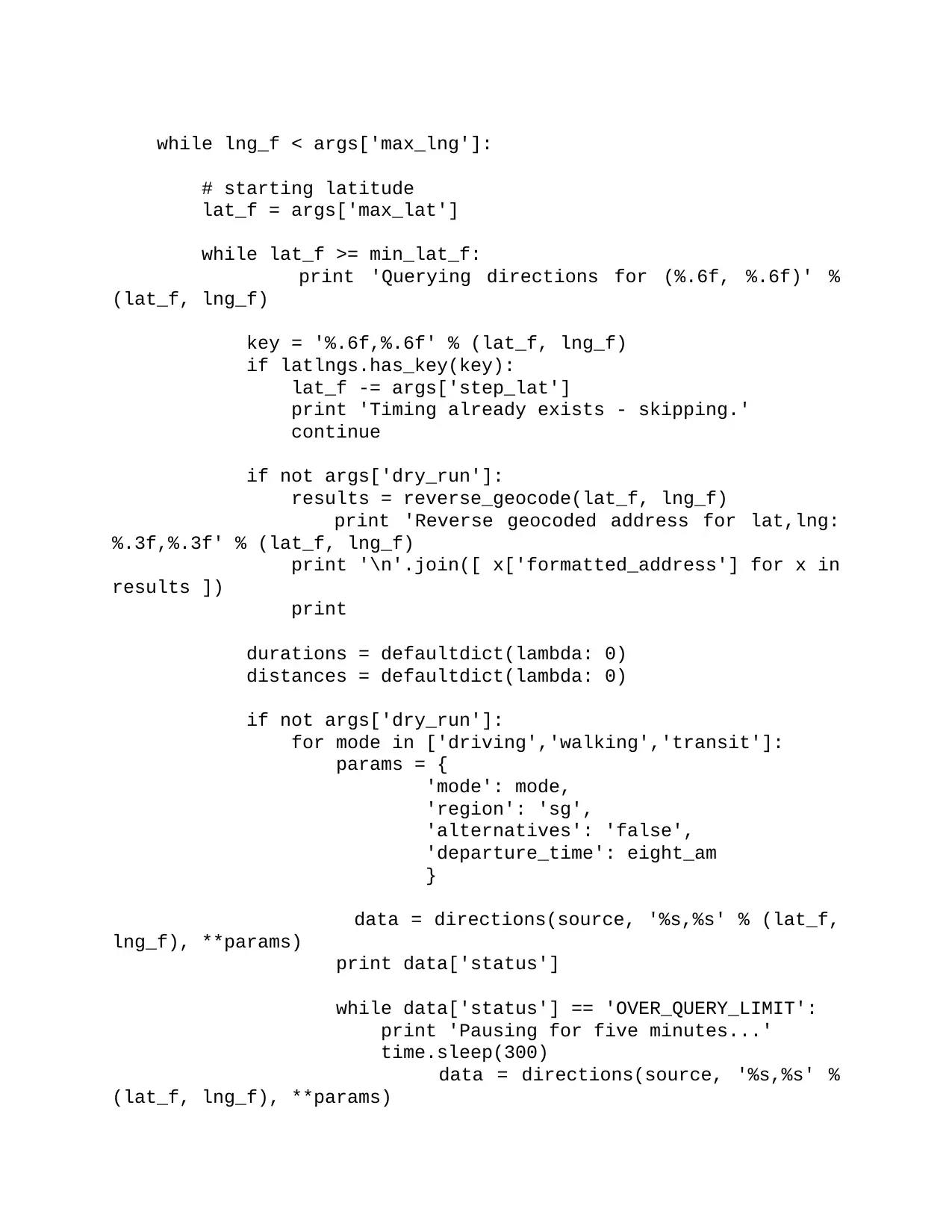
while lng_f < args['max_lng']:
# starting latitude
lat_f = args['max_lat']
while lat_f >= min_lat_f:
print 'Querying directions for (%.6f, %.6f)' %
(lat_f, lng_f)
key = '%.6f,%.6f' % (lat_f, lng_f)
if latlngs.has_key(key):
lat_f -= args['step_lat']
print 'Timing already exists - skipping.'
continue
if not args['dry_run']:
results = reverse_geocode(lat_f, lng_f)
print 'Reverse geocoded address for lat,lng:
%.3f,%.3f' % (lat_f, lng_f)
print '\n'.join([ x['formatted_address'] for x in
results ])
print
durations = defaultdict(lambda: 0)
distances = defaultdict(lambda: 0)
if not args['dry_run']:
for mode in ['driving','walking','transit']:
params = {
'mode': mode,
'region': 'sg',
'alternatives': 'false',
'departure_time': eight_am
}
data = directions(source, '%s,%s' % (lat_f,
lng_f), **params)
print data['status']
while data['status'] == 'OVER_QUERY_LIMIT':
print 'Pausing for five minutes...'
time.sleep(300)
data = directions(source, '%s,%s' %
(lat_f, lng_f), **params)
# starting latitude
lat_f = args['max_lat']
while lat_f >= min_lat_f:
print 'Querying directions for (%.6f, %.6f)' %
(lat_f, lng_f)
key = '%.6f,%.6f' % (lat_f, lng_f)
if latlngs.has_key(key):
lat_f -= args['step_lat']
print 'Timing already exists - skipping.'
continue
if not args['dry_run']:
results = reverse_geocode(lat_f, lng_f)
print 'Reverse geocoded address for lat,lng:
%.3f,%.3f' % (lat_f, lng_f)
print '\n'.join([ x['formatted_address'] for x in
results ])
durations = defaultdict(lambda: 0)
distances = defaultdict(lambda: 0)
if not args['dry_run']:
for mode in ['driving','walking','transit']:
params = {
'mode': mode,
'region': 'sg',
'alternatives': 'false',
'departure_time': eight_am
}
data = directions(source, '%s,%s' % (lat_f,
lng_f), **params)
print data['status']
while data['status'] == 'OVER_QUERY_LIMIT':
print 'Pausing for five minutes...'
time.sleep(300)
data = directions(source, '%s,%s' %
(lat_f, lng_f), **params)
Paraphrase This Document
Need a fresh take? Get an instant paraphrase of this document with our AI Paraphraser
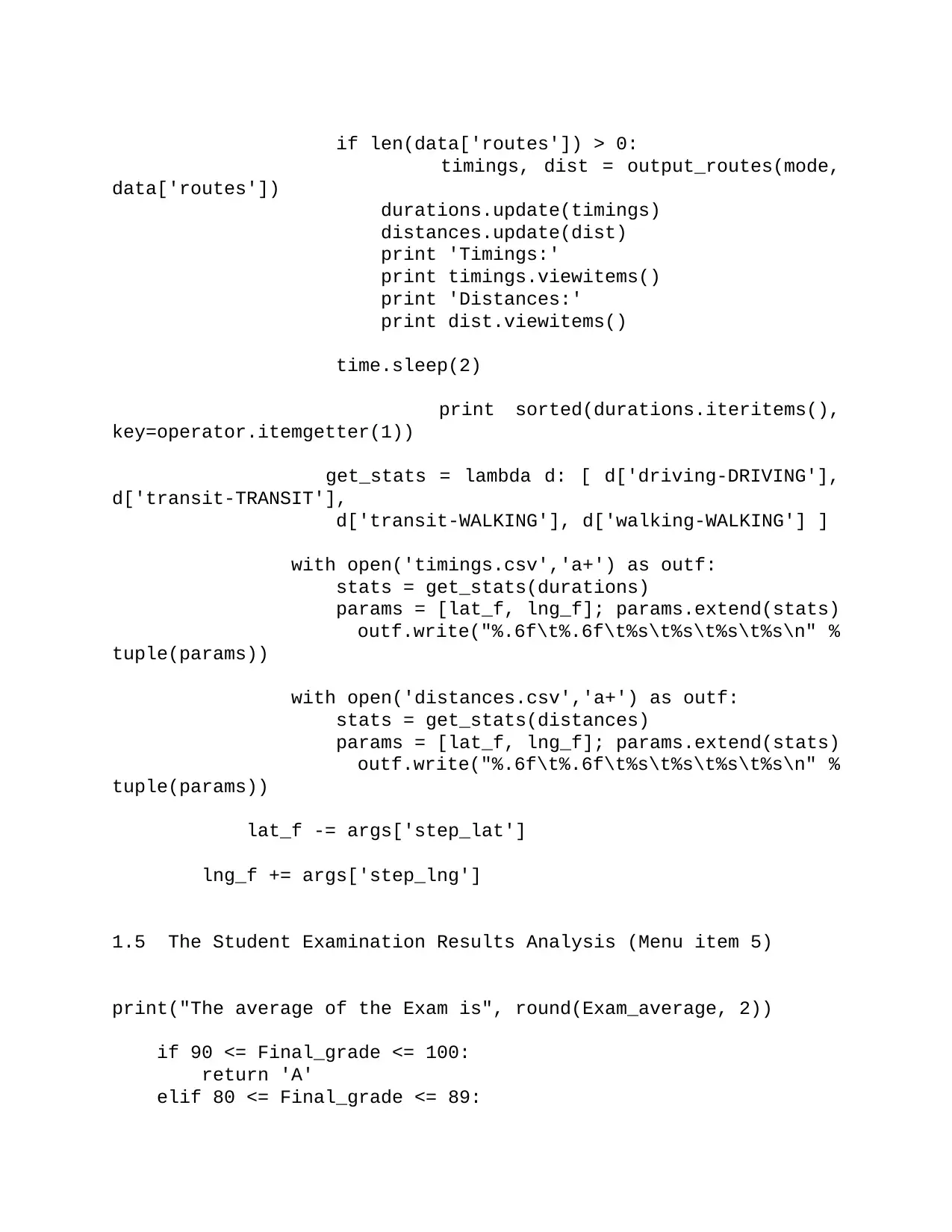
if len(data['routes']) > 0:
timings, dist = output_routes(mode,
data['routes'])
durations.update(timings)
distances.update(dist)
print 'Timings:'
print timings.viewitems()
print 'Distances:'
print dist.viewitems()
time.sleep(2)
print sorted(durations.iteritems(),
key=operator.itemgetter(1))
get_stats = lambda d: [ d['driving-DRIVING'],
d['transit-TRANSIT'],
d['transit-WALKING'], d['walking-WALKING'] ]
with open('timings.csv','a+') as outf:
stats = get_stats(durations)
params = [lat_f, lng_f]; params.extend(stats)
outf.write("%.6f\t%.6f\t%s\t%s\t%s\t%s\n" %
tuple(params))
with open('distances.csv','a+') as outf:
stats = get_stats(distances)
params = [lat_f, lng_f]; params.extend(stats)
outf.write("%.6f\t%.6f\t%s\t%s\t%s\t%s\n" %
tuple(params))
lat_f -= args['step_lat']
lng_f += args['step_lng']
1.5 The Student Examination Results Analysis (Menu item 5)
print("The average of the Exam is", round(Exam_average, 2))
if 90 <= Final_grade <= 100:
return 'A'
elif 80 <= Final_grade <= 89:
timings, dist = output_routes(mode,
data['routes'])
durations.update(timings)
distances.update(dist)
print 'Timings:'
print timings.viewitems()
print 'Distances:'
print dist.viewitems()
time.sleep(2)
print sorted(durations.iteritems(),
key=operator.itemgetter(1))
get_stats = lambda d: [ d['driving-DRIVING'],
d['transit-TRANSIT'],
d['transit-WALKING'], d['walking-WALKING'] ]
with open('timings.csv','a+') as outf:
stats = get_stats(durations)
params = [lat_f, lng_f]; params.extend(stats)
outf.write("%.6f\t%.6f\t%s\t%s\t%s\t%s\n" %
tuple(params))
with open('distances.csv','a+') as outf:
stats = get_stats(distances)
params = [lat_f, lng_f]; params.extend(stats)
outf.write("%.6f\t%.6f\t%s\t%s\t%s\t%s\n" %
tuple(params))
lat_f -= args['step_lat']
lng_f += args['step_lng']
1.5 The Student Examination Results Analysis (Menu item 5)
print("The average of the Exam is", round(Exam_average, 2))
if 90 <= Final_grade <= 100:
return 'A'
elif 80 <= Final_grade <= 89:
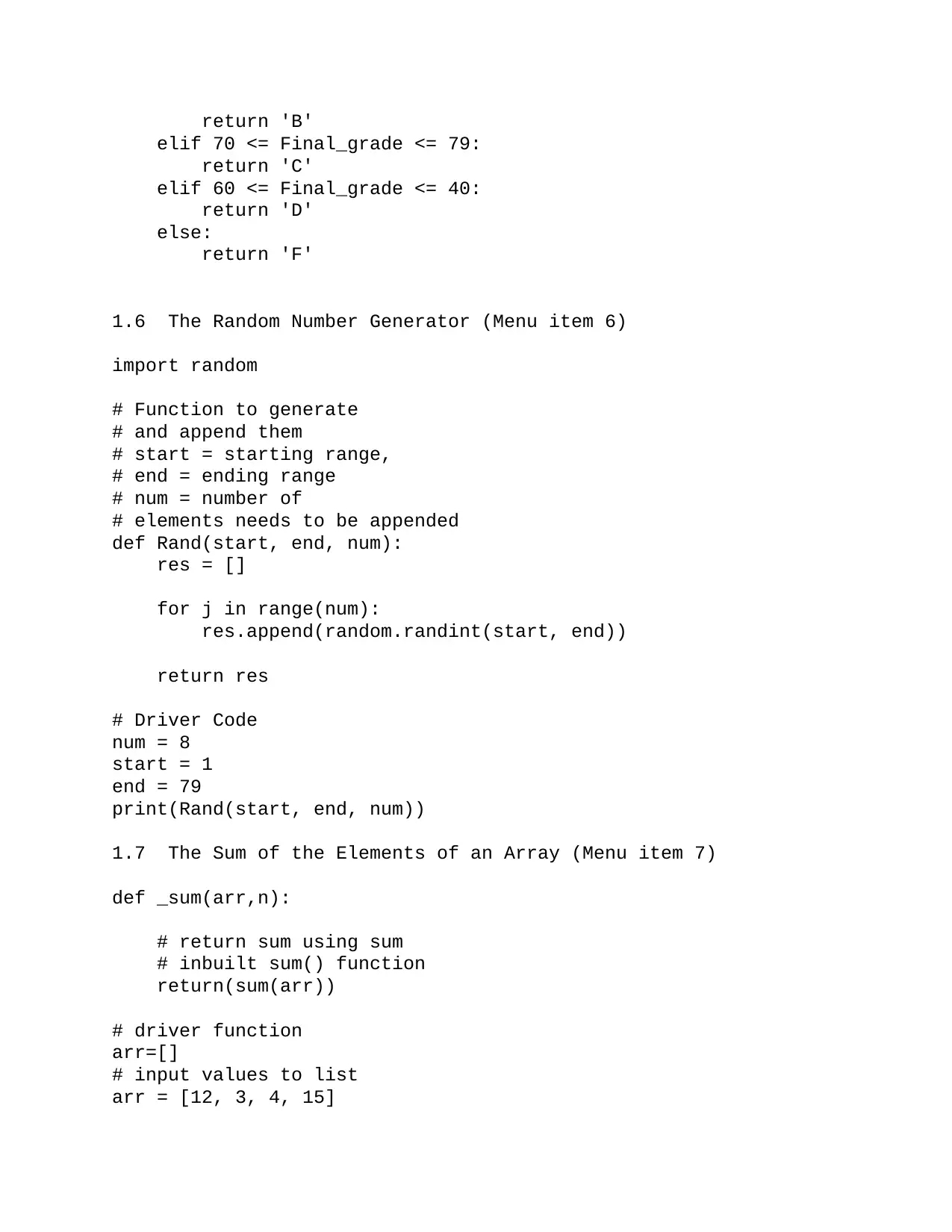
return 'B'
elif 70 <= Final_grade <= 79:
return 'C'
elif 60 <= Final_grade <= 40:
return 'D'
else:
return 'F'
1.6 The Random Number Generator (Menu item 6)
import random
# Function to generate
# and append them
# start = starting range,
# end = ending range
# num = number of
# elements needs to be appended
def Rand(start, end, num):
res = []
for j in range(num):
res.append(random.randint(start, end))
return res
# Driver Code
num = 8
start = 1
end = 79
print(Rand(start, end, num))
1.7 The Sum of the Elements of an Array (Menu item 7)
def _sum(arr,n):
# return sum using sum
# inbuilt sum() function
return(sum(arr))
# driver function
arr=[]
# input values to list
arr = [12, 3, 4, 15]
elif 70 <= Final_grade <= 79:
return 'C'
elif 60 <= Final_grade <= 40:
return 'D'
else:
return 'F'
1.6 The Random Number Generator (Menu item 6)
import random
# Function to generate
# and append them
# start = starting range,
# end = ending range
# num = number of
# elements needs to be appended
def Rand(start, end, num):
res = []
for j in range(num):
res.append(random.randint(start, end))
return res
# Driver Code
num = 8
start = 1
end = 79
print(Rand(start, end, num))
1.7 The Sum of the Elements of an Array (Menu item 7)
def _sum(arr,n):
# return sum using sum
# inbuilt sum() function
return(sum(arr))
# driver function
arr=[]
# input values to list
arr = [12, 3, 4, 15]
⊘ This is a preview!⊘
Do you want full access?
Subscribe today to unlock all pages.

Trusted by 1+ million students worldwide
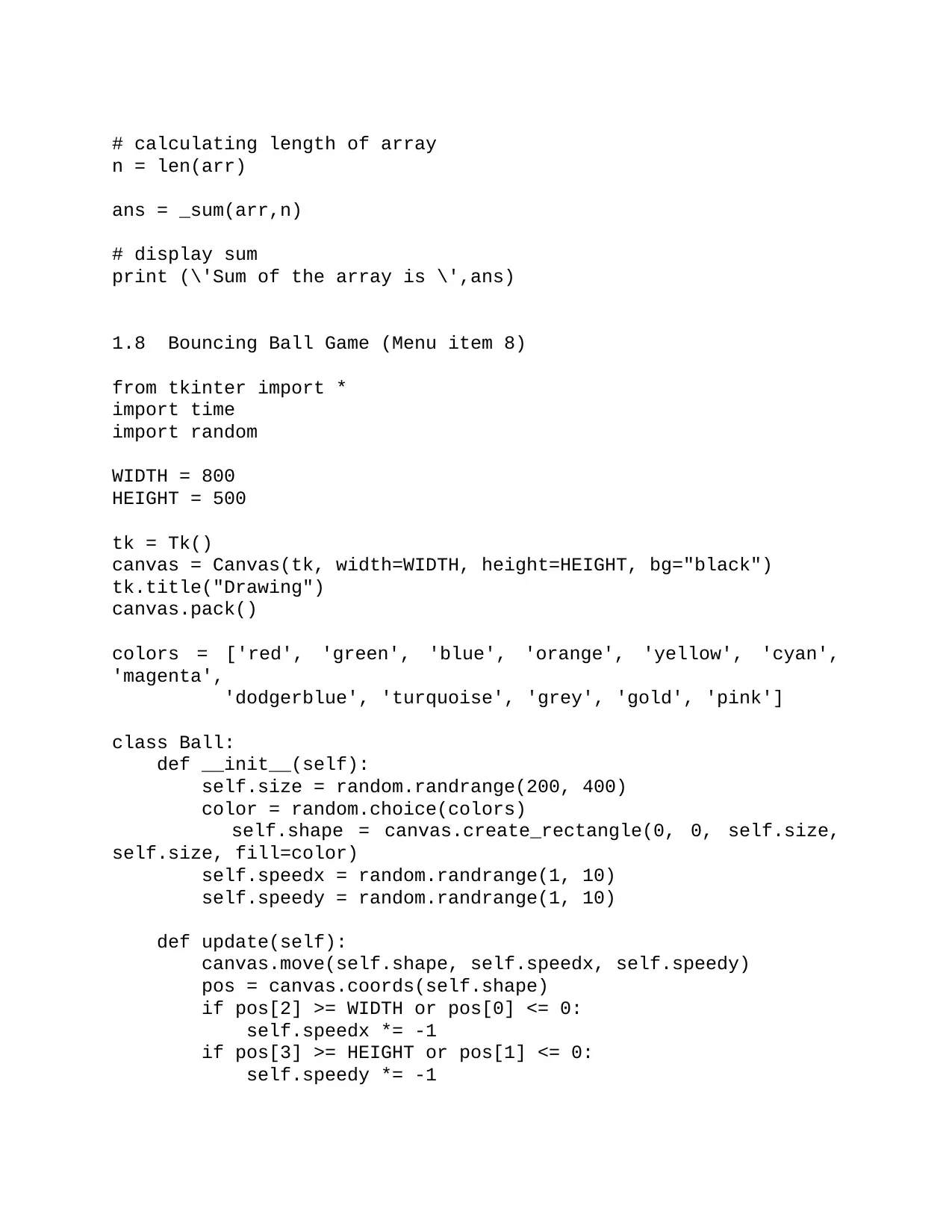
# calculating length of array
n = len(arr)
ans = _sum(arr,n)
# display sum
print (\'Sum of the array is \',ans)
1.8 Bouncing Ball Game (Menu item 8)
from tkinter import *
import time
import random
WIDTH = 800
HEIGHT = 500
tk = Tk()
canvas = Canvas(tk, width=WIDTH, height=HEIGHT, bg="black")
tk.title("Drawing")
canvas.pack()
colors = ['red', 'green', 'blue', 'orange', 'yellow', 'cyan',
'magenta',
'dodgerblue', 'turquoise', 'grey', 'gold', 'pink']
class Ball:
def __init__(self):
self.size = random.randrange(200, 400)
color = random.choice(colors)
self.shape = canvas.create_rectangle(0, 0, self.size,
self.size, fill=color)
self.speedx = random.randrange(1, 10)
self.speedy = random.randrange(1, 10)
def update(self):
canvas.move(self.shape, self.speedx, self.speedy)
pos = canvas.coords(self.shape)
if pos[2] >= WIDTH or pos[0] <= 0:
self.speedx *= -1
if pos[3] >= HEIGHT or pos[1] <= 0:
self.speedy *= -1
n = len(arr)
ans = _sum(arr,n)
# display sum
print (\'Sum of the array is \',ans)
1.8 Bouncing Ball Game (Menu item 8)
from tkinter import *
import time
import random
WIDTH = 800
HEIGHT = 500
tk = Tk()
canvas = Canvas(tk, width=WIDTH, height=HEIGHT, bg="black")
tk.title("Drawing")
canvas.pack()
colors = ['red', 'green', 'blue', 'orange', 'yellow', 'cyan',
'magenta',
'dodgerblue', 'turquoise', 'grey', 'gold', 'pink']
class Ball:
def __init__(self):
self.size = random.randrange(200, 400)
color = random.choice(colors)
self.shape = canvas.create_rectangle(0, 0, self.size,
self.size, fill=color)
self.speedx = random.randrange(1, 10)
self.speedy = random.randrange(1, 10)
def update(self):
canvas.move(self.shape, self.speedx, self.speedy)
pos = canvas.coords(self.shape)
if pos[2] >= WIDTH or pos[0] <= 0:
self.speedx *= -1
if pos[3] >= HEIGHT or pos[1] <= 0:
self.speedy *= -1
Paraphrase This Document
Need a fresh take? Get an instant paraphrase of this document with our AI Paraphraser
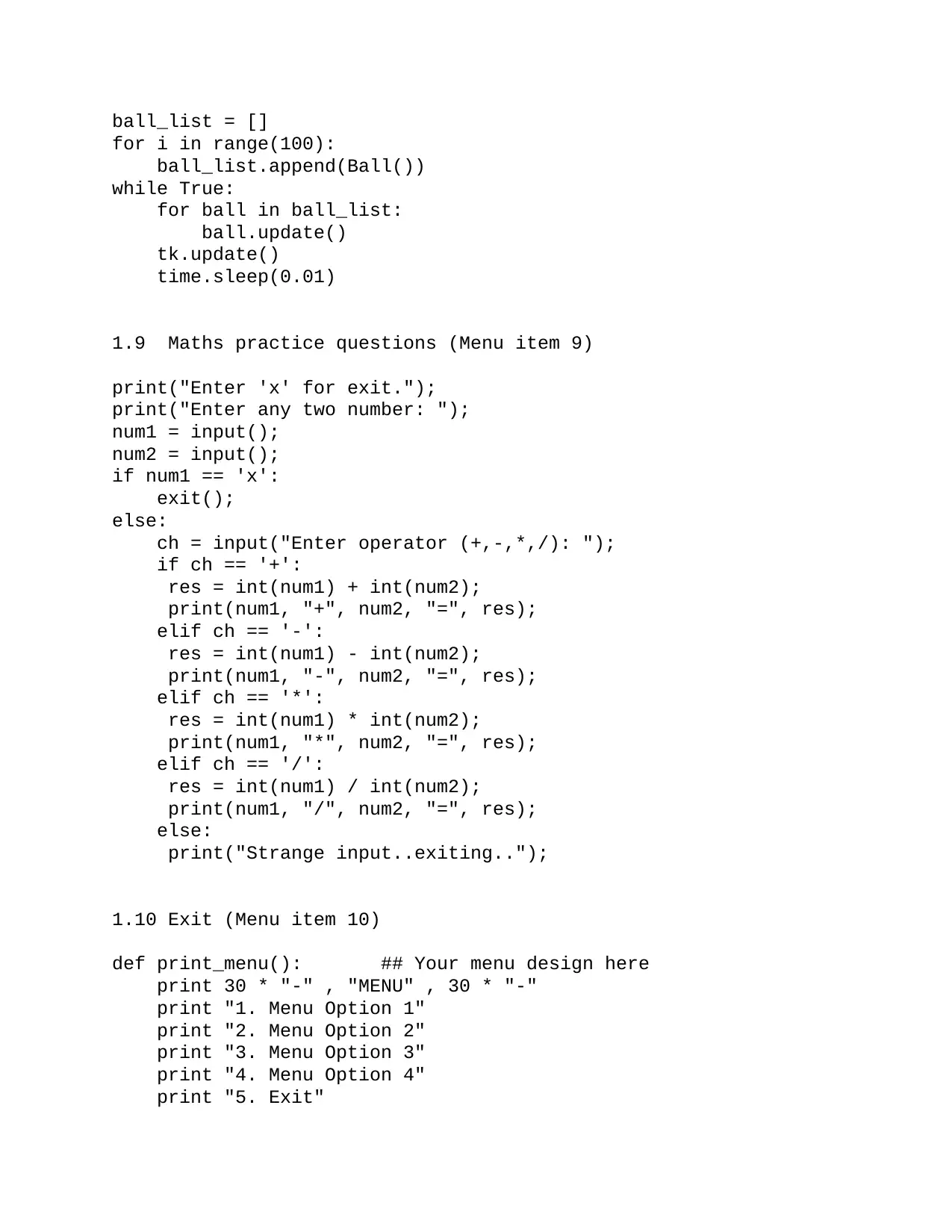
ball_list = []
for i in range(100):
ball_list.append(Ball())
while True:
for ball in ball_list:
ball.update()
tk.update()
time.sleep(0.01)
1.9 Maths practice questions (Menu item 9)
print("Enter 'x' for exit.");
print("Enter any two number: ");
num1 = input();
num2 = input();
if num1 == 'x':
exit();
else:
ch = input("Enter operator (+,-,*,/): ");
if ch == '+':
res = int(num1) + int(num2);
print(num1, "+", num2, "=", res);
elif ch == '-':
res = int(num1) - int(num2);
print(num1, "-", num2, "=", res);
elif ch == '*':
res = int(num1) * int(num2);
print(num1, "*", num2, "=", res);
elif ch == '/':
res = int(num1) / int(num2);
print(num1, "/", num2, "=", res);
else:
print("Strange input..exiting..");
1.10 Exit (Menu item 10)
def print_menu(): ## Your menu design here
print 30 * "-" , "MENU" , 30 * "-"
print "1. Menu Option 1"
print "2. Menu Option 2"
print "3. Menu Option 3"
print "4. Menu Option 4"
print "5. Exit"
for i in range(100):
ball_list.append(Ball())
while True:
for ball in ball_list:
ball.update()
tk.update()
time.sleep(0.01)
1.9 Maths practice questions (Menu item 9)
print("Enter 'x' for exit.");
print("Enter any two number: ");
num1 = input();
num2 = input();
if num1 == 'x':
exit();
else:
ch = input("Enter operator (+,-,*,/): ");
if ch == '+':
res = int(num1) + int(num2);
print(num1, "+", num2, "=", res);
elif ch == '-':
res = int(num1) - int(num2);
print(num1, "-", num2, "=", res);
elif ch == '*':
res = int(num1) * int(num2);
print(num1, "*", num2, "=", res);
elif ch == '/':
res = int(num1) / int(num2);
print(num1, "/", num2, "=", res);
else:
print("Strange input..exiting..");
1.10 Exit (Menu item 10)
def print_menu(): ## Your menu design here
print 30 * "-" , "MENU" , 30 * "-"
print "1. Menu Option 1"
print "2. Menu Option 2"
print "3. Menu Option 3"
print "4. Menu Option 4"
print "5. Exit"
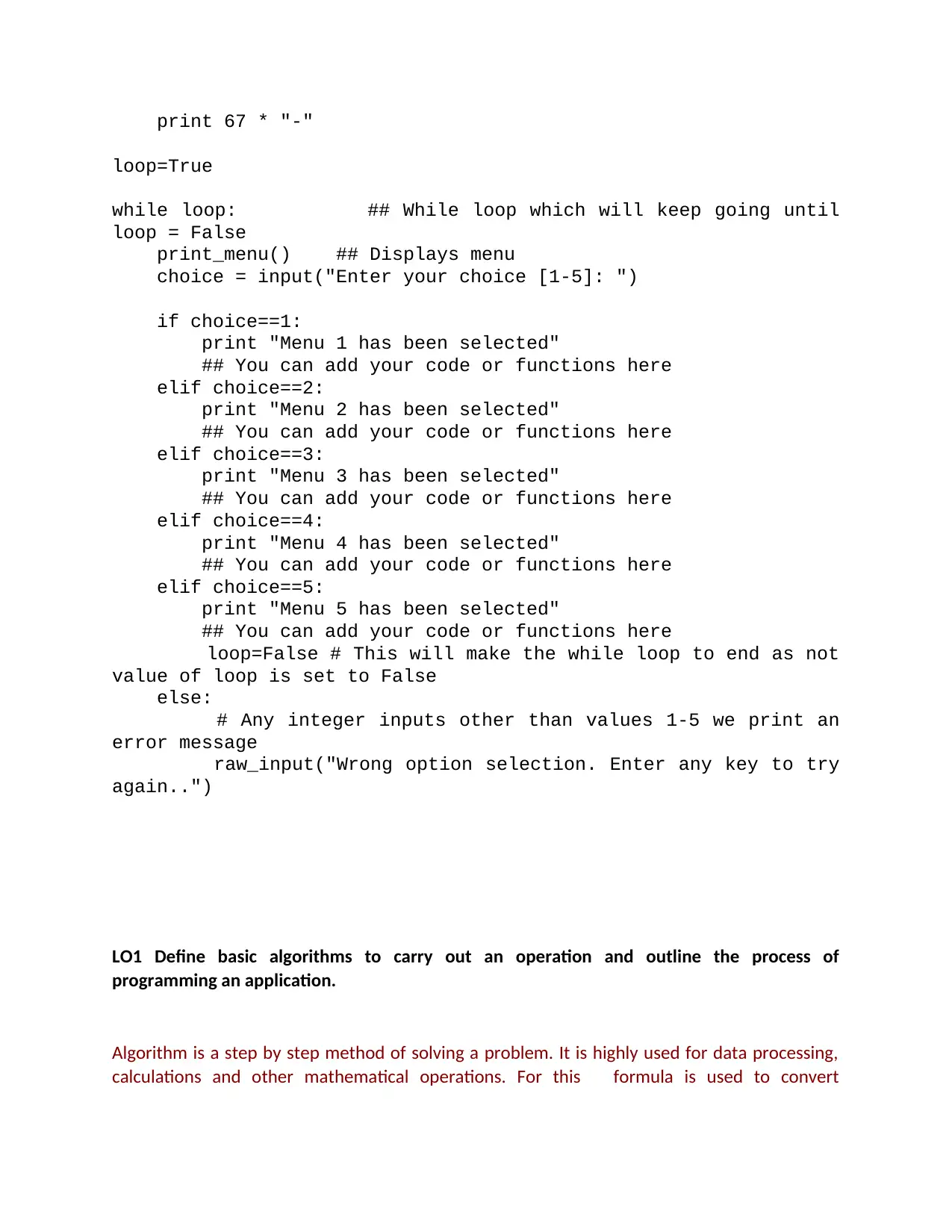
print 67 * "-"
loop=True
while loop: ## While loop which will keep going until
loop = False
print_menu() ## Displays menu
choice = input("Enter your choice [1-5]: ")
if choice==1:
print "Menu 1 has been selected"
## You can add your code or functions here
elif choice==2:
print "Menu 2 has been selected"
## You can add your code or functions here
elif choice==3:
print "Menu 3 has been selected"
## You can add your code or functions here
elif choice==4:
print "Menu 4 has been selected"
## You can add your code or functions here
elif choice==5:
print "Menu 5 has been selected"
## You can add your code or functions here
loop=False # This will make the while loop to end as not
value of loop is set to False
else:
# Any integer inputs other than values 1-5 we print an
error message
raw_input("Wrong option selection. Enter any key to try
again..")
LO1 Define basic algorithms to carry out an operation and outline the process of
programming an application.
Algorithm is a step by step method of solving a problem. It is highly used for data processing,
calculations and other mathematical operations. For this formula is used to convert
loop=True
while loop: ## While loop which will keep going until
loop = False
print_menu() ## Displays menu
choice = input("Enter your choice [1-5]: ")
if choice==1:
print "Menu 1 has been selected"
## You can add your code or functions here
elif choice==2:
print "Menu 2 has been selected"
## You can add your code or functions here
elif choice==3:
print "Menu 3 has been selected"
## You can add your code or functions here
elif choice==4:
print "Menu 4 has been selected"
## You can add your code or functions here
elif choice==5:
print "Menu 5 has been selected"
## You can add your code or functions here
loop=False # This will make the while loop to end as not
value of loop is set to False
else:
# Any integer inputs other than values 1-5 we print an
error message
raw_input("Wrong option selection. Enter any key to try
again..")
LO1 Define basic algorithms to carry out an operation and outline the process of
programming an application.
Algorithm is a step by step method of solving a problem. It is highly used for data processing,
calculations and other mathematical operations. For this formula is used to convert
⊘ This is a preview!⊘
Do you want full access?
Subscribe today to unlock all pages.

Trusted by 1+ million students worldwide
1 out of 24
Your All-in-One AI-Powered Toolkit for Academic Success.
+13062052269
info@desklib.com
Available 24*7 on WhatsApp / Email
![[object Object]](/_next/static/media/star-bottom.7253800d.svg)
Unlock your academic potential
Copyright © 2020–2026 A2Z Services. All Rights Reserved. Developed and managed by ZUCOL.
